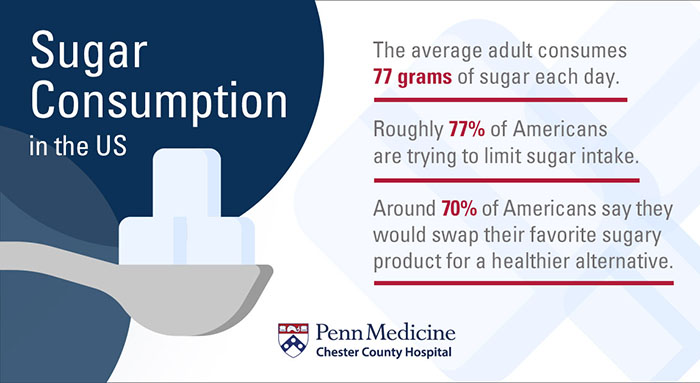A large breed dog, a microwave oven, a bear cub, a 9-year-old child — these are just a few things that weigh roughly 60 pounds.
You know what else weighs around 60 pounds? The average amount of added sugar Americans consume each year. This is about three times the recommended amount for women.
Sugar consumption is a significant problem in the US. From soft drinks to cafe lattes to sugary snacks, there are many products in a typical daily diet that come with loads of added sugar.
Unfortunately, too much added sugar can be unhealthy. Each day, men should consume no more than 36 grams (9 tsp, or 150 calories) of sugar, and women should consume no more than 25 grams (6 tsp, or 100 calories).

The good news is that many Americans are committed to reducing it in their diets.
Reducing sugar in diet is an important and worthwhile goal. As a part of this endeavor, many people are turning to artificial sweeteners and sugar substitutes. But while things like Splenda and Diet Coke may offer zero calories, these alternatives might not be as healthy as you might think.
Here’s the down-low on artificial sweeteners and sugar substitutes — and whether or not they really are the healthy alternative they claim to be.
First, What’s the Problem With Added Sugar?
Sugar isn’t the enemy. In fact, there are plenty of naturally occurring sources of sugar, such as in fruit and milk, that are part of a healthy diet. For instance, fruits don’t just contain sugar — they’re also full of crucial vitamins and minerals.
Added sugars, however, are another story. These are sugars that are added while preparing or processing food — but add zero nutrients to your diet. Unfortunately, the calories in added sugar can lead to weight gain, obesity, heart problems, and type 2 diabetes.
Major sources of added sugars include soft drinks, candy, cookies, cakes, ice cream, and sweetened yogurt. There’s also sugar you add yourself, such as into your morning coffee, on strawberries, or over your toast.
However, artificial sweeteners and sugar substitutes boast little to no calories. This alternative to added sugar may be tempting — but it may also be misleading.
What Kinds of Sugar Alternatives Are Available?
There are many types of sugar alternatives, all of which are intended to sweeten up your food or beverages without the added calories.
Common artificial sweeteners and sugar substitutes include:
- Saccharin, like Sweet’N Low
- Aspartame, like Equal or NutraSweet
- Sucralose, like Splenda
- Stevia, like Truvia or SweetLeaf
- Sugar alcohols, like sorbitol, xylitol, and lactitol
- Monk fruit, like PureFruit
There’s also agave nectar, which isn’t calorie-free, but has been touted as healthier than sugar.
The primary reason these sugar alternatives are so popular is simple — fewer calories and carbohydrates. They offer a way to indulge in sweets without feeling particularly guilty about what you’re eating or drinking.
Sound too good to be true? Well, that’s because it might be.
Concerns With Artificial Sweeteners and Sugar Substitutes
To begin, swapping Coke for Diet Coke or sugar for Splenda isn’t a magic fix. The idea that artificial sweeteners and sugar substitutes will suddenly make you healthier is misleading, and cutting one source of sugar is not a way to significantly change your diet.
Instead, a well-rounded diet is full of fresh fruits and veggies, whole grains, fat-free or low-fat dairy products, and, of course, limited added sugar.
Additionally, health experts are still learning about the impacts of sugar alternatives. For instance, in the 1970s, research done on animals suggested that artificial sweeteners could cause cancer. However, later studies have found this isn’t true in humans, and the American Cancer Society says there is no clear evidence that links low-calorie sweeteners with increased cancer risk.
Still, other studies have revealed potential concerns — particularly surrounding aspartame, saccharin, and sugar alcohols.
For example, one study found that aspartame (like in Equal and NutraSweet) and saccharin (like in Sweet'N Low) might be associated with an increased risk of irritability and depression.
As for sugar alcohols, like sorbitol and xylitol, these ingredients aren’t absorbed by your body during digestion. However, since they can still draw in fluid, consuming them can cause diarrhea.
Are There Any Harmless Sugar Alternatives?
There are a couple of sugar alternatives that don’t seem to come with unwanted side effects.
Take agave nectar as an example. While it doesn’t offer any nutritional value, and it still contains calories, it’s sweeter than sugar. That means you can use less of it to get the same effect.
Or, there’s stevia, which comes from the stevia leaf. The World Health Organization says up to 1.8 milligrams per pound of body weight is safe for this plant-based sweetener. That means up to two beverages sweetened with stevia instead of sugar may be a good way to limit your sugar intake.
The Bottom Line: A Healthy Diet and Lifestyle
As with most factors of your diet, moderation is key. While sugar alternatives offer the benefit of low or zero calories, they’re not a magic bullet, and you should still monitor your intake of these products.
Most importantly, simply replacing sugar with an alternative is not enough to take care of your body. Instead, prioritize eating fresh fruits and veggies, drinking plenty of water, staying active, and getting enough sleep.
And, of course, be sure to limit your sugar intake — both real and artificial. Sugar and sugar alternatives may be sweet, but so is living a long and happy life.
Do You Have Questions about Artificial Sweeteners, Sugar Substitutes or Eating Healthy?
Call 610-738-2300 to speak to a nutritionist provider at Chester County Hospital. Or check out one of our Nutrition and Weight Control classes.
Related Information from Chester County Hospital: